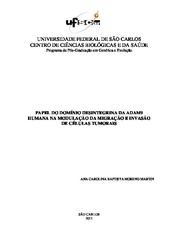| dc.contributor.author | Martin, Ana Carolina Baptista Moreno | |
| dc.date.accessioned | 2016-06-02T20:21:26Z | |
| dc.date.available | 2011-04-25 | |
| dc.date.available | 2016-06-02T20:21:26Z | |
| dc.date.issued | 2011-02-25 | |
| dc.identifier.citation | MARTIN, Ana Carolina Baptista Moreno. Papel do domínio desintegrina da ADAM9 humana na modulação da migração e invasão de células tumorais. 2011. 113 f. Dissertação (Mestrado em Ciências Biológicas) - Universidade Federal de São Carlos, São Carlos, 2011. | por |
| dc.identifier.uri | https://repositorio.ufscar.br/handle/ufscar/5484 | |
| dc.description.abstract | Cancer metastasis is the major cause of death, consequently studies to understand the molecular mechanisms involved in this process are essential to the knowledge of this disease. Cell migration and invasion are part of the metastatic process; therefore, molecules that are able to prevent cell migration can be used as model to develop new anti-metastasis drugs. The aim of this project was to study the mechanisms involved on metastasis, then the disintegrin domain of a human ADAM9 (A Disintegin and Metalloprotease), ADAM9D, was cloned in the pGEX-4T-1 plasmid and was expressed in E. coli AD494(DE3) in a soluble and active form. Assays were performed using mama and prostate cancer cells (MDA-MB-231 and DU- 145 respectively) with ADAM9D to verify its functions and the interactions with its ligands. ADAM9D was able to bind to different integrins, β1, αvβ5, αvβ3 and α2 in both cell lines, but only with α6 in DU-145 cells. ADAM9D inhibited cell adhesion to collagen type I in MDAMB- 231 cell, however it did not have the same effect in DU-145 cells. During the proliferation assay ADAM9D did not affect the proliferation in all cell lines tested (MDAMB- 231, DU-145 and human fibroblasts). ADAM9D decreased cell invasion and migration in the transwell and wound healing assays, MMP-2 and MMP-9 had lower expression. ADAM9D decreased cell invasion and migration (wound healing assay), although in the transwell migration assay, ADAM9D increased cell migration and MMP-2/-9 expression. Therefore, this project provides more information about the disintegrin domain of ADAM9 and its role in cell invasion and migration of prostate and mama cancer cells. | eng |
| dc.description.sponsorship | Universidade Federal de Sao Carlos | |
| dc.format | application/pdf | por |
| dc.language | por | por |
| dc.publisher | Universidade Federal de São Carlos | por |
| dc.rights | Acesso Aberto | por |
| dc.subject | Desintegrina | por |
| dc.subject | Integrina | por |
| dc.subject | Metástase | por |
| dc.subject | Células - migração | por |
| dc.subject | ADAM | por |
| dc.subject | Invasão | por |
| dc.subject | ADAM | eng |
| dc.subject | Disintegrin | eng |
| dc.subject | Integrin | eng |
| dc.subject | Migration | eng |
| dc.subject | Invasion | eng |
| dc.subject | Metastasis | eng |
| dc.title | Papel do domínio desintegrina da ADAM9 humana na modulação da migração e invasão de células tumorais | por |
| dc.type | Dissertação | por |
| dc.contributor.advisor1 | Araújo, Heloísa Sobreiro Selistre de | |
| dc.contributor.advisor1Lattes | http://genos.cnpq.br:12010/dwlattes/owa/prc_imp_cv_int?f_cod=K4787059Y2 | por |
| dc.description.resumo | A metástase é a maior causa de morte no câncer, desta forma estudos que visam compreender os mecanismos nela envolvidos são importantes para o entendimento deste processo. A migração e invasão celular participam do processo metastático, portanto, estudos de moléculas que impeçam a migração podem fornecer as bases para o desenvolvimento de fármacos anti-metastáticos. Com o objetivo de estudar os mecanismos envolvidos na metástase, o domínio desintegrina de uma ADAM (A Desintegrin And Metalloprotease) humana, a ADAM9D foi clonada em vetor bacteriano pGEX-4T-1 e expresso em células E. coli AD494(DE3) de forma solúvel e ativa. Ensaios celulares nas linhagens de câncer de mama (MDA-MB-231) e próstata (DU-145) foram realizados utilizando a ADAM9D no intuito de verificar suas funções e interações com ligantes. A ADAM9D é capaz de interagir com as integrinas β1, αvβ5, αvβ3 e α2 nas duas linhagens celulares e com a subunidade α6 somente na linhagem DU-145. A ADAM9D inibiu a adesão ao colágeno tipo I na linhagem MDA-MB-231, entretanto, não teve a mesma capacidade na linhagem DU-145. No ensaio de proliferação celular a ADAM9D não apresentou atividade em nenhuma das linhagens celulares testadas (Fibroblastos humanos, MDA-MB-231 e DU-145). Nas células MDA-MB- 231 a ADAM9D inibiu a invasão e migração em ensaios transwell e de wound healing, além de inibir a expressão das metalopeptidases de matriz, MMP2 e MMP-9. A ADAM9D, nas células de câncer de próstata, inibiu a invasão e a migração em ensaio de wound healing. Entretanto, no ensaio de migração transwell a ADAM9D provocou um aumento da migração celular e um aumento na expressão das MMP-2 e MMP-9 no ensaio wound healing. Portanto, este estudo foi capaz de fornecer mais informações sobre as funções do domínio desintegrina, e sobre seu papel na migração e invasão de células tumorais de câncer de mama e de próstata. | por |
| dc.publisher.country | BR | por |
| dc.publisher.initials | UFSCar | por |
| dc.publisher.program | Programa de Pós-Graduação em Genética Evolutiva e Biologia Molecular - PPGGEv | por |
| dc.subject.cnpq | CIENCIAS BIOLOGICAS::BIOQUIMICA::BIOLOGIA MOLECULAR | por |
| dc.contributor.authorlattes | http://lattes.cnpq.br/0612591885565016 | por |
